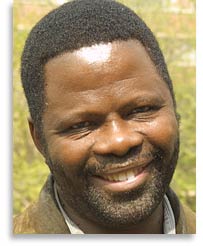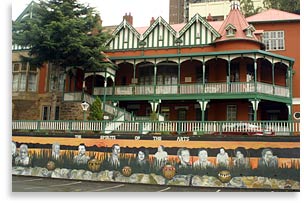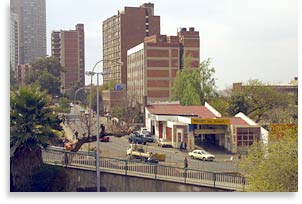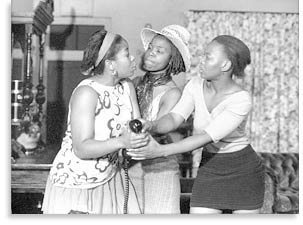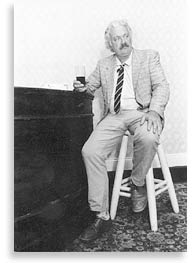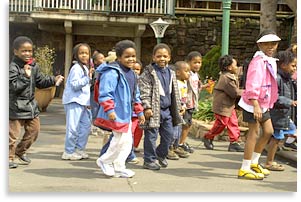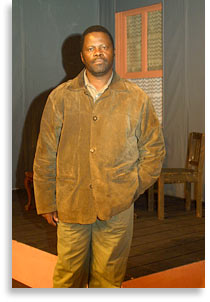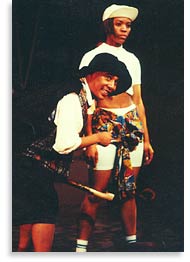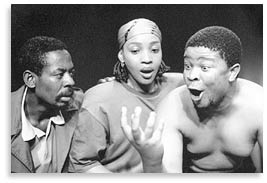|
Walter Chakela is a playwright, a poet, a theatrical director, and chief executive officer and artistic director of the Windybrow Centre for the Arts in Johannesburg, South Africa. He has written twenty-two plays and directed many others. This interview was conducted by Nic Paget-Clarke, August 30, 2002, at the time of the United Nations World Summit on Sustainable Development -- to read related interviews and articles click here. In Motion Magazine: Could you please give me a brief history of the Windybrow Centre for the Arts? Walter Chakela: The Windybrow was first and foremost a residential house for a man called Theodore Reunert who was a mining engineer. The house was built in 1896. I think he called it the Windybrow because he admired the poetry of Robert Southey the English poet whose home in England was also called the Windybrow. It became a cultural institution much, much later, in fact in 1987, after standing unoccupied for several years. It was converted to a theater at the time as part of the State Theater in Pretoria. It was the Johannesburg branch of the State Theater. I came and took it over in 1993, February, and re-named it the Windybrow Centre for the Arts. It has been a multicultural space since then.
Walter Chakela: This neighborhood where the Windybrow stands is actually called Doornfontein. But it is very near, in fact only a street separates it from, what is popularly known as Hillbrow, up the hill. This hill that leads onto the Hillbrow is called the Nugget Hill. The neighborhood Hillbrow / Berea / Doornfontein was an area in the olden days of apartheid where some of the intellectuals who had left ideological leanings toward apartheid lived. They integrated quite early on with black intellectuals. Hillbrow, in particular, became a kind of intellectual hub of Johannesburg. An intellectual melting pot of black and white ideas about the progressive future of South Africa. So, despite that particular fact, Hillbrow has suffered from the effects of capital flight from the inner city and seems like an economically depressed area today. It has a glorious history though, which I hope can be re-captured. It probably will be completely re-configured now the area represents almost every nation of Africa. With the advent of a democratic South Africa in '94 a lot of people from the rest of the continent travelled south. Nigerian writer, Bankole Omotoso writes in a book of his that migrations to the south were very apt. There were significant migrations by many people to the south after 1994. And these migrations to the south seem to be represented very significantly by the communities that live in Hillbrow. In Motion Magazine: What's the significance of calling the Windybrow a multicultural center, in a South African context? Walter Chakela: In the olden days it was serving white aesthetic interests. The programming was very Eurocentric and there was very little participation by black communities or black artists in shaping the programming of the Windybrow. In 1993, when I took over, I consciously opened things up for a more varied sampling of voices in the Windybrow. At the moment, there are white artists and black artists and artists from the rest of the continent who bring their work to the Windybrow. I know because we now live in a non-racial, non-sexist South Africa that that by itself pre-supposes that we are a multicultural society, but some institutions are struggling to adjust to multicultural programming. Some people by virtue of the kind of education they have received during apartheid still think in mono-cultural terms and are unable to conceptualise programs for institutions which are intrinsically multicultural. In Motion Magazine: Could you give some examples of types of art or performances?
In Motion Magazine: Could you give some names of some of the people who perform here? Walter Chakela: Among the people who have been here at the Windybrow annual workshops is Keorapetse Kgositsile , who is a professor of literature and is now working in the Culture Department of the city of Johannesburg. He used to be a professor of literature at Wayne State University. Before he came to South Africa he was at UCLA in California. We have people like Dennis Brutus, who is a patron of the Center and one of our top poets. He comes and does readings. In fact, later on this year we have a tribute reading in his honor. We've also had Robert Earl Price from Atlanta whose work we have presented at the Windybrow, specifically the play called "Blue Monk" which ran here from April of this year. Robert and Del Hamilton of Seven Stages Theater in Atlanta were here. Del was directing and Robert, of course, is the writer. We have had Amiri Baraka and his friend Miguel Algarin doing readings and workshops. And Nadine Gordimer, who is our top novelist in South Africa, is a board member of the Windybrow. She, too, has run a number of workshops as well as attended a number of readings. In Motion Magazine: The people who attend the workshops . Do you relate to the surrounding communities in that way?Walter Chakela: Especially our poetry reading sessions. They tend to attract a lot of young people who live around here. Hillbrow, Berea, Yeoville, and Doornfontein itself. They are the backbone of the Wednesday programs. We have attracted people through our development programs for playwrights, for actors, for new South African work. We have attracted people from Soweto and Alexander, but also people have come from Pretoria to be part of our programs.
In Motion Magazine: What was the impact of the elections? Was there an impact? Walter Chakela: There was an impact. For some people the impact was one of paralysis. This is a perception. Some critics have punted the idea around that South African writers have run out of things to write about. They are confused as to what to write about since 1994, or maybe since the un-banning of the political movements such as the ANC (African National Congress), the PAC (Pan Africanist Congress), the Black Consciousness Movement. But sitting where I am, (my other hat is Artistic Director of this Center,) I am exposed to a lot of new work that has to be presented at this Center. I have seen work that grapples with the very idea of transition, the very moment of the release of political prisoners from Robben Island. What that moment means. The whole process of negotiations. Writers look at that and try and unpack it for what it truly represents. what the struggle was about. When the first black president of South Africa was inaugurated, Dr. Mandela, some of the literature was about, "This is wonderful. Let's celebrate this moment. It's a moment we have all been waiting for and fighting for." Others say, "What is this? Is this authentic? Is this true liberation? Is this true democracy?" Especially because, you know, people who develop ideas about freedom, their own freedom at the expense of other people's freedom, tend to be very entrenched in those ideas. Also there is no moment in history that is a cut-off point. There are overlaps. As a result, the vestiges of apartheid are still very clear in our society. We will be celebrating in 2004 our ten-year anniversary of democracy, but people still suffer apartheid. The South African economy is still made up of a white economy and a black economy which is miniscule in the global order of South African economies. The whole question of black economic empowerment is still a very vexed question. A lot of black people feel that there is no true commitment to black economic empowerment. It is too slow. There are too many barriers standing in the way of new entrepreneurs, black entrepreneurs coming into the mainstream of the economy. Others are feeling that those companies that have offered opportunities to come aboard are not very genuine because they offload stocks to black people that are basically useless, have no value. That black people go into the mining industry only to find that the mines that they are taking up are actually exhausted. They are of low value. So, there are these questions that people are asking. But also, racial discrimination in certain communities is still alive and well, people say, "If we are really in the new South Africa why are there still these cases of discrimination, of white on black violence, or even black on white violence." There are those instances. And some writers have looked at those issues.
All in all, I think, in terms of literature, South Africa is probably the best place in the world today for any writer to be, precisely because there are these contradictions and there are these questions that are being asked either of us, or that we ask ourselves of ourselves. Black Arts during apartheid00000 In Motion Magazine: Prior to your coming here, this was a primarily white venue. How did black people find venues and how did the arts movement survive? Walter Chakela: Before the '90s, the Black Arts Movement survived mainly in the townships. There was no infrastructure to support the Black Arts at all. We performed our plays in churches and school halls. From time to time some of us would get breaks to get out of the country and perform overseas. That would be the only time when we would really perform in some facilities that were of any standard at all. There were no funding agencies in the country - or very few. There were some corporate companies that would fund some Black Arts projects in the townships but government, for instance, did not spend a penny on the black arts. Most of the budget for arts and culture was spent on the facilities that catered for the four million white people at the time. Of course, the contradiction is that the same budget is now expected to cater for forty-three million people and that makes it particularly difficult. Although I must say that over the last couple of years the Department of Arts and Culture has tried to increase that budget as much as it can. But it's competing against other things that are regarded as more pressing and more important like healthcare and housing. Conflict resolution / Industrial Theater In Motion Magazine: Do you see art used in conflict resolution? Walter Chakela: Actually, I think, yes, if the arts can be used as an important front in the revolution it can also be used in conflict resolution. In fact, South Africa has become a bit of a leader in a genre of theater called industrial theater which is a kind of theater that is used to address issues that occur on the shop floor in the corporate world. These issues include safety on the shop floor but they also deal with questions of transformation. Transformation from an apartheid culture, to a democratic culture, a democratic corporate culture. When new legislation that has been passed in the new South Africa tries to address questions of fair labor practice, those issues are being communicated on the shop floor through industrial theater. This is for managers to understand but also for workers to understand the issues because without it there are a lot of adversarial relationships on the shop floor. This theater is attempting to correct those issues. Of course, issues of AIDS are also taken up by this form of theater - industrial theater. I believe that the arts can be very important in resolving conflicts. They can fan conflict as well, but I think they can resolve conflict.
Walter Chakela: Oh yes, I try to encourage variety as much as possible . My main thing is that people should express themselves in the art form that they are most comfortable in. So, if it is dance, it's got to be dance. If it is poetry so be it . I find that young people all over the world for some strange reason feel that poetry is the best medium for them to express themselves. Especially inner city youth seem to have taken to that. So I encourage that. Some of my colleagues who are much more seasoned poets question whether kwaito or hip-hop, whether those are really poetry, the whole question of spoken word. Is spoken word poetry? Is it some kind of diluted form of the real thing? What is it that we can do to intervene and give spoken word much more depth? But I encourage that because I find that when young people have space to do their spoken word, their hip-hop, or their kwaito, invariably they develop an interest in discovering the work of Dennis Brutus and they are lead to reading other poets and that informs the way they write their own. I encourage that. Kwaito also is a form of music, a kind of South African hip-hop. It also is a form of music that has its critics for its lack of depth. But I find that the young people start doing kwaito and then they invariably want to discover other things, including jazz, as they go along. Those for me are important gateways for young people to get into so-called mainstream culture. In Motion Magazine: This is a deliberately naïve question, but I really don't know the answer. Is all art political? Walter Chakela: Yes, I think so. There tends to be a lot of consciousness about society, the behavior of society. There is a lot of consciousness about identity, about having a sense of history, understanding your history and how your history forms your present. There's a lot of consciousness about issues of gender. But also the whole identity of South Africa. A lot of people were cut off from the rest of the continent, the African continent, and are now celebrating their closer relationship with the rest of the continent. A lot of musicians talk in glorious terms about Africa. About being a part of Africa, the magnificence of Africa. Yes, it is, but I'm really still to find an art form that is apolitical. I find that a lot of art tends to take on issues of who people are and what they are all about. What they dream about. How they see the future.
Walter Chakela: Oh yes. Windybrow may be compared to many other cultural institutions that have a very close relationship with the schools. We do programs that relate to what students study in school. The most popular program that we do is a program for high school students who study English literature. I adapted a novel by one of South Africa's leading novelists Bessie Head. Her novel is called "Maru" and I adapted that to a stage play. Just last week we finished the run of that production. We had just reached 8,000 students by the end of the program. In Motion Magazine: You say you adapted the novel to the play? Walter Chakela: Yes. In Motion Magazine: Are you an artist yourself? Walter Chakela: Yes, I am a playwright and a poet. Although, I think my claim to a place in the arts as a practioner is more as a result of my play writing and directing, I also am productive as a poet. In certain circles, I am known more as a poet than a playwright. I have written about twenty-two plays at this stage. Probably directed a lot more than that. When I was in the States recently doing a play at 7 Stages Theater, it was one of my plays called "Sweat" which ran for about five weeks in Atlanta. So, I am productive as an artist although I am an arts administrator as well. In Motion Magazine: Can you talk about some of the ideas you are working on now? Walter Chakela: I'm currently working with two projects. One I've been working on for a few years. It's a play written in narrative verse which interrogates history . It is a dialogue between the present and the past. The first part is set in contemporary South Africa around Capetown. This character is walking on the beach. He wonders what it was like for our ancestors, especially the Khoisan people who were living around there, around the 1500s. How it was walking on the beach at that time. How it felt when they saw the first Spanish explorers arriving with their ships on shore. Wondering what the communication was like between them. And how that moment, that first moment of meeting with them, how it is that it contributed to colonialism. Then, of course, the past answers. This piece is written in four movements. Two movements are based in the past. Two movements are based in the present to the past. It is written in narrative verse. In Motion Magazine: How do you create and administrate? Walter Chakela: It is a delicate balance because I have to remind myself that both are very important. That there is a reason why I am straddling both. Neither of them should suffer because I have a preference for the other. I am, first and foremost, an artist and my heart lies with creativity at any time but I am almost constantly paranoid about neglecting administration in preference for creativity. It is a balance that I'm consciously trying to fine tune.
At the same time, I don't want to have regrets as an artist and say I should have written five novels and I've only written twenty-two plays. I don't want to have those regrets. Somehow, I've got to find space to continue to write the things that I would love to write. I wish, almost, that people in the arts like myself had the privileges of university professors who can go on sabbatical. In Motion Magazine: At what age did you start writing? Walter Chakela: I started writing when I was a kid. I started writing when I was in high school. My first play was written in 1973. And this was as a student. I produced it with my colleagues at school. But I think the bug bit me then because it was quite an experience for me. Quite an uplifting experience for me to ultimately see my ideas in action on stage. I've never looked back since then. I started working professionally in the '80s, the early '80s. I started doing productions that would come to the Market Theater or go to the Grahamstown Festival. This was when I broke into professional theater. But still I had to keep my day job at that time. I worked as an insurance consultant of all things until 1989 when, largely through the work that I did with my independent theater company, the province that I lived in, the North-West, started an arts council and I was asked to form the drama company of the arts council. That's when I first got my job as a full-time artist/art administrator and I was also their playwright-in-residence. In Motion Magazine: Doing that in the context of apartheid -- how did you deal with that? Walter Chakela: I don't think any of us actually know exactly how we survived apartheid. I don't think any of us had very clearly thought out strategies as to how to fight that. It is just probably the question of how magnificent the human spirit is, especially in times of adversity. How you somehow rise to the occasion and you ultimately triumph over adversity. I had many of my plays banned. They would allow me to rehearse productions, at that time, because I wasn't getting any money from any funding. I was using my own money. They would allow me to rehearse and on the eve of opening the production they would slam me with a banning order. "Your play cannot be launched."
Walter Chakela: Absolutely. It was just dead. I would try to fight that. I would try to appeal the banning. In Motion Magazine: They knew they were going to do it all along? Walter Chakela: Yes, they knew. The idea was to frustrate me. They were monsters of torture. They were just masters of torture. I remember I did this other play. This was not even a play I wrote myself. It was a Kenyan play based on the history of the Mau Mau uprisings by a Kenyan playwright called Kuldip Sondi. It's called "The Encounter". We rehearsed it for four weeks, and two days before it was to open the Department of Internal Affairs came over to me and said to me, "Look, your play cannot be opened. There is a banning order." They said, "If you like, you can appeal the banning order." But that would not save the opening night because I had to instruct lawyers and papers had to be prepared. But I started the process to appeal. Every Wednesday, I appeared in court trying to argue my case. I had some university professors. I had the law department of the North-West University represent me. After six weeks of doing that I just got tired of it and let it go. In Motion Magazine: None of your plays were ever performed? Walter Chakela: Some of them were performed. If you came to Johannesburg to perform, some municipal functionary had to look at the script of your play and approve it for performance. They would then give you a license to perform. We would, at times, misrepresent the real issues in the play in the script, because at some point it became very dangerous to write scripts. This is why if you look at the 1980's in South African theater, especially black South African theater, there were a lot of workshopped and improvised plays. Plays that were not scripted anywhere because it became very dangerous to write plays down. Sometimes, we would produce a script because when you said to a bureaucrat, "Look, this script, this play was workshopped so there is no script," they said, "There is no play that can be workshopped. In fact, workshops are where you make things. Blacksmiths and such people have workshops. Artists don't have workshops. Don't turn us into fools." We would then write something down that was safe and then give this to the guy to read. There would be nothing about apartheid or anything. And they would say, "That's fine. You can perform." Of course, the play that then goes on stage that evening is completely different from the script that you gave this guy to read. In Motion Magazine: Did they ever show up? Walter Chakela: Sometimes they did. They were very patient. They had time. They would turn up and then we would have problems. You would probably not even be able to go to the next city after betraying them like that. But this is how some of the plays would be performed. Some wouldn't. We tried all sorts of things. In some towns they didn't know they had to do that so we would just go in and perform. In Motion Magazine: You traveled around the country? Walter Chakela: We did a lot of one-night-stands in various cities. In Motion Magazine: What was the name of your theater group. Walter Chakela: Molopo Experimental Theatre Group, METGRO.
Walter Chakela: Yes. In Motion Magazine: So was theater a way for political ideas to surface? Was there a connection? Walter Chakela: I never went into exile. I resisted the exile up to the last. In the 1970s, most of my generation were in the Black Consciousness Movement, Steve Biko's organization. We had a lot of sympathy for the African National Congress and the Pan Africanist Congress but those were in exile. They had no life in the country except in the underground. There was a lot of underground work that was done.The interesting thing is that there was a time in the history of our politics when ideological differences were not as pronounced as they are today. There was a lot of interaction between Black Consciousness people and the ANC people or PAC people. Especially in the country. We got stories that in exile the lines were a bit more rigid - the ideological lines. But within the country they were a lot more lax. Whilst we were in the Black Consciousness Movement, we also talked a lot about the ANC, we also talked a lot about the PAC as part of our structures of resistance against apartheid. As an artist we tended not to be card-carrying members. In fact, there were not political parties at that time. The ANC was a political movement as well as the PAC and the Black Consciousness Movement. We were not really hags in the sense of carrying cards saying I belong to one and not the other. What we were concerned with was this theater, this poetry, this literature that conscientized the community. In Motion Magazine: Where do you see things going? How do you see the arts movement developing? Walter Chakela: Obviously, my concern at the moment is that we should continue to create, for artists to express themselves. We don't have enough publications for young writers to see themselves in print, unfortunately. In the past, we used to have a magazine called "The Staff Rider" which published short stories and poetry and short plays. Young people had a sort of literary playground before they formulated their works into anthologies and other things. I would like to see a magazine like that come back. I would like to see more alternative publishing houses which have the guts to take the work of new writers, young writers, women writers. Our theaters should open a lot more. Have more readings of new works with a view to producing these ultimately. I would like to see more discourse publicly based on where we are going as a nation culturally -- the content of our culture -- so that we are not left at the mercy of Hollywood. I would like to see our museums reflecting more of ourselves, our history. Our museums again are Eurocentric monsters on our cultural landscape. There is not sufficient transformation. Not sufficient ownership of who we have become as a nation. One would like to see more of that happening. And then of course the direction will evolve by itself once there are those outlets. Whatever it is it will be exciting. Published in in Motion Magazine, March 16, 2003 |
||||||||||||||||||||||||||||||||||||||||||||||||||||||||||||||||||||||||||||||||||||||||||||||||||||||||||||||||||||||||||||||||||||||||||||||||||||||||||||||||||||||||||||||||||||||||||||||
If you have any thoughts on this or would like to contribute to an ongoing discussion in the  What is New? || Affirmative Action || Art Changes || Autonomy: Chiapas - California || Community Images || Education Rights || E-mail, Opinions and Discussion || En español || Essays from Ireland || Global Eyes || Healthcare || Human Rights/Civil Rights || Piri Thomas || Photo of the Week || QA: Interviews || Region || Rural America || Search || Donate || To be notified of new articles || Survey || In Motion Magazine's Store || In Motion Magazine Staff || In Unity Book of Photos || Links Around The World || OneWorld / US || NPC Productions Copyright © 1995-2014 NPC Productions as a compilation. All Rights Reserved. |
||||||||||||||||||||||||||||||||||||||||||||||||||||||||||||||||||||||||||||||||||||||||||||||||||||||||||||||||||||||||||||||||||||||||||||||||||||||||||||||||||||||||||||||||||||||||||||||


